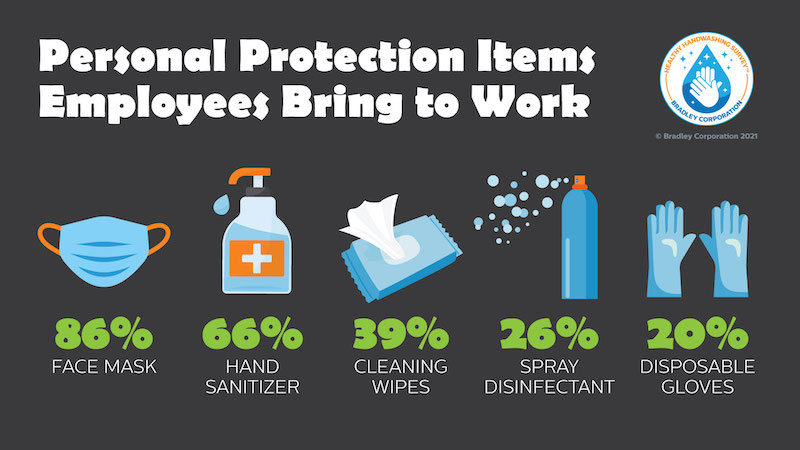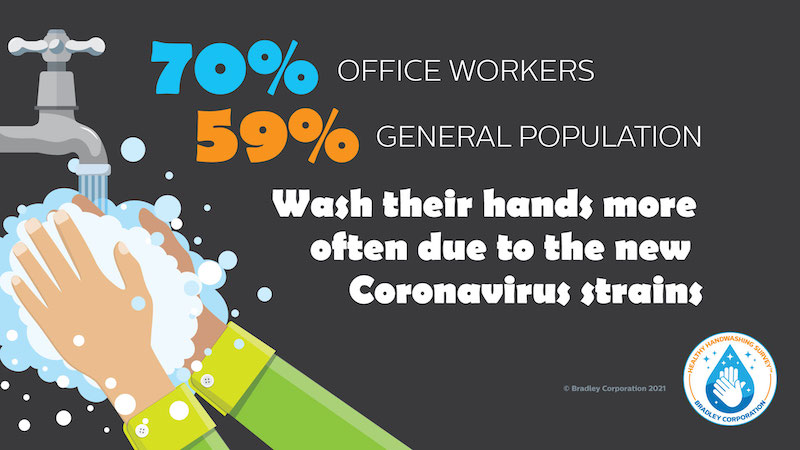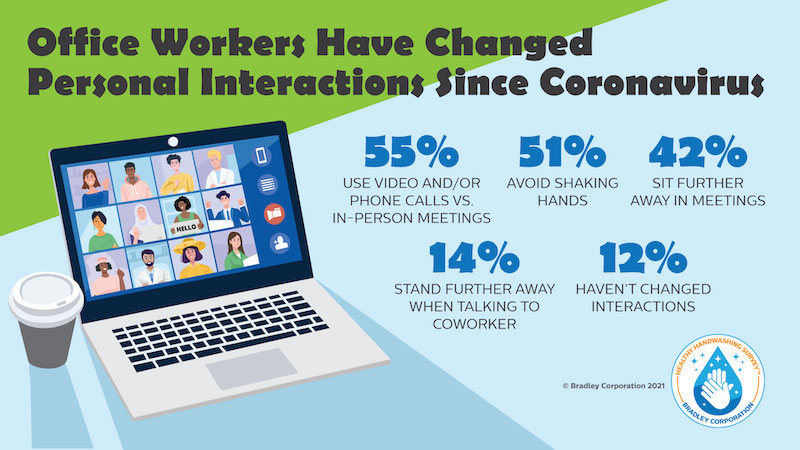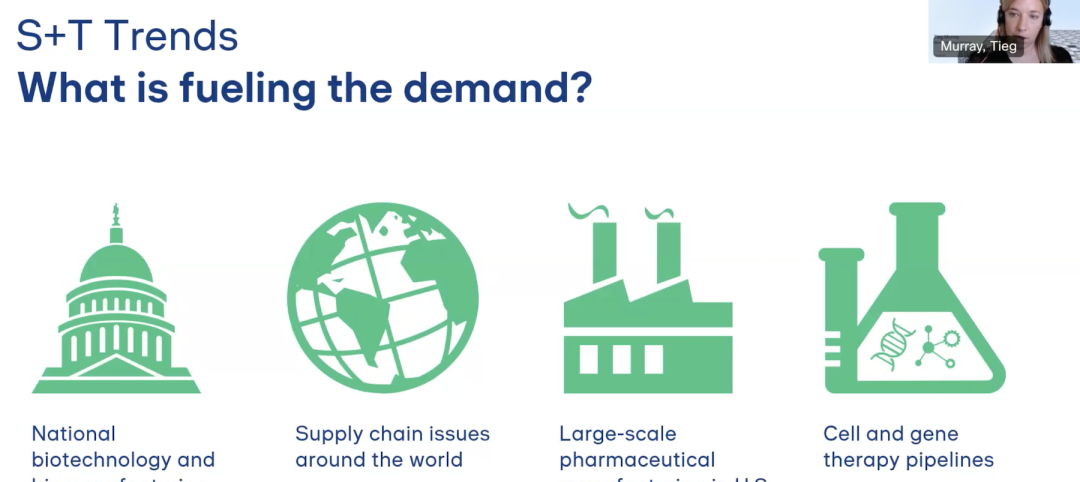As office workers in the U.S. continue returning to their places of employment, Bradley Corp. conducted its Healthy Handwashing Survey™ and found that coronavirus concerns persist, especially as new variants emerge. In response, employees are taking preventive actions. 86% are bringing a mask with them to work and 73% have been fully vaccinated. In addition to masks, office workers are packing a few other personal protection items: 66% have their own hand sanitizer; 39% are taking cleaning wipes; and 29% are prepared with disinfectant spray.
The survey also revealed that, compared to the general population, office workers are significantly more conscious about coming in contact with germs and more concerned about contracting the coronavirus. 73% of office workers worry about getting the coronavirus versus 67% of the general population. And, due to the rise in new strains of the virus, 70% of office workers have implemented a more rigorous handwashing regimen versus 59% of the general population.

The Healthy Handwashing Survey from Bradley Corp. queried 1,035 American adults Aug. 3-10, 2021, about their handwashing habits, concerns about the coronavirus and their return to the workplace. A subset of 513 respondents who work in offices were identified and asked a series of applicable questions. Participants were from around the country and were evenly split between men and women. The Healthy Handwashing Survey of the general population has a margin of error of +/- 3% and the office worker subset has a margin of error of +/- 4, with a 95% confidence level.
The ongoing pandemic has also led to changes in the work environment – namely how workers interact with their colleagues. At the office, 51% avoid shaking hands, 42% sit further way in meetings and 36% use a video call instead of meeting in person. In terms of hand hygiene, approximately two-out-of-three office workers are washing their hands more frequently since returning to the office, with half washing six or more times a day.

“Office workers are returning to the workplace cautiously—particularly now with the prevalence of the Delta variant—and are personally taking steps to avoid germs and the virus,” says Jon Dommisse, Vice President of Marketing and Corporate Communication, Bradley Corp. “The coronavirus has notched up the need for cleaner workspaces, limited contact and increased handwashing.”
Coronavirus Concerns Spur Hand Hygiene Practices
With office workers washing their hands more frequently, 62% report their employers have made changes or improvements to workplace restrooms in response to the pandemic, including more frequent cleanings. And, in a sign of today’s pandemic times, 79% of office workers believe touchless restroom fixtures are important. Case in point, when using their workplace restroom, two-thirds reach for a paper towel to avoid touching restroom door handles, the toilet flusher and faucet handles. Another one-third use their foot to operate the toilet flusher.
Within the workspace, employers have added hand sanitizing stations and encouraged employees to stay home when sick. Those actions haven’t gone unnoticed or unappreciated by employees. 53% of office workers say their employer’s response to the pandemic and implementation of safety measures makes them feel more valued and 35% say it makes them feel more positive about the company they work for.

Related Stories
Industry Research | Dec 28, 2022
Following a strong year, design and construction firms view 2023 cautiously
The economy and inflation are the biggest concerns for U.S. architecture, construction, and engineering firms in 2023, according to a recent survey of AEC professionals by the editors of Building Design+Construction.
Self-Storage Facilities | Dec 16, 2022
Self-storage development booms in high multifamily construction areas
A 2022 RentCafe analysis finds that self-storage units swelled in conjunction with metros’ growth in apartment complexes.
Market Data | Dec 13, 2022
Contractors' backlog of work reaches three-year high
U.S. construction firms have, on average, 9.2 months of work in the pipeline, according to ABC's latest Construction Backlog Indicator.
Contractors | Dec 6, 2022
Slow payments cost the construction industry $208 billion in 2022
The cost of floating payments for wages and invoices represents $208 billion in excess cost to the construction industry, a 53% increase from 2021, according to a survey by Rabbet, a provider of construction finance software.
Mass Timber | Dec 1, 2022
Cross laminated timber market forecast to more than triple by end of decade
Cross laminated timber (CLT) is gaining acceptance as an eco-friendly building material, a trend that will propel its growth through the end of the 2020s. The CLT market is projected to more than triple from $1.11 billion in 2021 to $3.72 billion by 2030, according to a report from Polaris Market Research.
Market Data | Nov 15, 2022
Construction demand will be a double-edged sword in 2023
Skanska’s latest forecast sees shorter lead times and receding inflation, but the industry isn’t out of the woods yet.
Reconstruction & Renovation | Nov 8, 2022
Renovation work outpaces new construction for first time in two decades
Renovations of older buildings in U.S. cities recently hit a record high as reflected in architecture firm billings, according to the American Institute of Architects (AIA).
Market Data | Nov 3, 2022
Building material prices have become the calm in America’s economic storm
Linesight’s latest quarterly report predicts stability (mostly) through the first half of 2023
Building Team | Nov 1, 2022
Nonresidential construction spending increases slightly in September, says ABC
National nonresidential construction spending was up by 0.5% in September, according to an Associated Builders and Contractors analysis of data published today by the U.S. Census Bureau.
Hotel Facilities | Oct 31, 2022
These three hoteliers make up two-thirds of all new hotel development in the U.S.
With a combined 3,523 projects and 400,490 rooms in the pipeline, Marriott, Hilton, and InterContinental dominate the U.S. hotel construction sector.

















